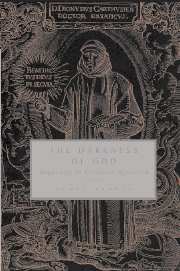Book contents
- Frontmatter
- Contents
- Acknowledgements
- Introduction
- PART ONE TWO SOURCES AND A SYNTHESIS
- 1 The Allegory and Exodus
- 2 Cataphatic and the apophatic in Denys the Areopagite
- 3 The God within: Augustine's Confessions
- 4 Interiority and ascent: Augustine's De Trinitate
- 5 Hierarchy interiorised: Bonaventure's Itinerarium Mentis in Deum
- PART TWO DEVELOPMENTS
- Further reading
- Index
4 - Interiority and ascent: Augustine's De Trinitate
Published online by Cambridge University Press: 23 November 2009
- Frontmatter
- Contents
- Acknowledgements
- Introduction
- PART ONE TWO SOURCES AND A SYNTHESIS
- 1 The Allegory and Exodus
- 2 Cataphatic and the apophatic in Denys the Areopagite
- 3 The God within: Augustine's Confessions
- 4 Interiority and ascent: Augustine's De Trinitate
- 5 Hierarchy interiorised: Bonaventure's Itinerarium Mentis in Deum
- PART TWO DEVELOPMENTS
- Further reading
- Index
Summary
The language of interiority is a metaphorical discourse which at once structures Augustine's thought about selfhood, and organizes his personal sense of himself. It has, that is to say, both a conceptually and an experientially structuring power. As a metaphor it has no merely decorative purpose, nor in any other way could Augustine's understanding of self or of God survive its removal; nor are there any other terms to which that metaphor could be reduced.
This much I have tried to show in the last chapter. In this chapter we must raise some more detailed questions about how the metaphor articulates Augustine's thought, in particular about how the ‘inner’ as a category of thought and experience is to be distinguished from the ‘outer’ – for manifestly they are correlative, mutually defining, terms. Above all we must try to determine where the line of demarcation is meant to fall between the ‘inner’ and the ‘outer’: at what point do I cease to think or experience in an ‘outward’ way and begin to think or experience ‘inwardly’? And then we must ask how this discourse of inwardness relates with that other, complementary, discourse of ascent. We might say that if the last chapter was concerned with the dynamics of these metaphors, in this we will be concerned with their epistemological structure, their statics.
It would be a mistake to expect from Augustine any single, consistent and formal statement of how this distinction is to be made out even in any one work, let alone throughout his vast œuvre. Augustine's intellectual development is too exploratory, his temperament too tentative, for such expectations ever to be reasonable.
- Type
- Chapter
- Information
- The Darkness of GodNegativity in Christian Mysticism, pp. 74 - 101Publisher: Cambridge University PressPrint publication year: 1995



